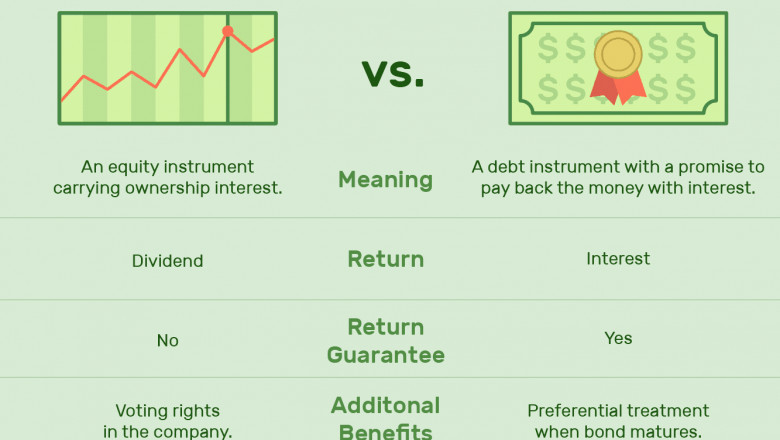views

When it comes to investing, stocks and bonds are two of the most popular options. Both have their pros and cons, and it can be tough to decide which is the right investment for you. If you're interested in investing, take some time to learn the similarities and differences between stocks and bonds by following this comprehensive guide. Keep reading to learn more.
What are stocks?
Stocks are a type of security representing an ownership stake in a company. When you buy a stock, you become a part owner of the company and may receive dividends if the company is profitable. When you invest in stocks, you are buying a piece of a company. This gives you a claim to a portion of the company's profits and assets. In addition, stockholders typically have voting rights, which allow them to help elect the board of directors and influence other important decisions made by the company. Stocks can be bought on public exchanges or through private placement.
To track daily fluctuations and trends in the market, investors often use FinanceCharts, a website that provides users with stock and bond graphs. The site offers various features, including the ability to overlay different types of securities on top of each other to compare performance and the ability to save charts for future reference. FinanceCharts also offers a wide range of data points for stocks and bonds, going back as far as 1871 for stocks and 1864 for bonds.
What are bonds?
When a company or government wants to borrow money, it can issue a bond instead of going to a bank. Bonds are a type of investment that investors can buy. You lend money to the company or government when you buy a bond. In return, the company or government promises to pay you back your money, plus interest, at a specific time in the future. Bonds are a very common way for companies and governments to borrow money. The US government has been issuing bonds since the 18th century. There are different types of bonds, depending on who is issuing them and what they are used for. Some common types of bonds include corporate, government, and municipal bonds.
Bonds can be a very safe investment, but they also carry some risk. The most significant risk is that the company or government may be unable to pay back your money, plus interest, on time. This is called defaulting on a bond. If this happens, you may not get all of your money back. Changes in interest rates can also impact bonds. When interest rates go up, the value of bonds goes down, and when interest rates go down, the value of bonds goes up. This is because when interest rates go up, it becomes more expensive for companies and governments to borrow money, so the interest rates they offer on their bonds go up as well.
What are the differences between stocks and bonds?
When people think about stocks and bonds, they may reference their similarities. However, the two options also have some key differences. One of the biggest differences between stocks and bonds is that stocks represent ownership in a company, while bonds are loans to companies. When you buy a stock, you become a part owner of the company and have a claim on its assets and earnings. When you buy a bond, you are lending money to the company in exchange for periodic interest payments and the return of your principal at maturity.
Another key difference is that stocks are more volatile than bonds. This means they can go up or down in value more quickly and by more amounts. Because of this volatility, stocks tend to provide higher returns over time than bonds. However, they also come with more risk since there is a chance that you could lose some or all of your investment if the company goes bankrupt. Bonds are less risky since you will get your principal back even if the company fails, but they also offer lower returns than stocks.
Stocks and bonds are two lucrative ways to make money and offer different risks and rewards. It's important to understand what you're buying before investing and diversify your investments. With a little bit of knowledge and a lot of hard work, you can start making money with stocks and bonds.












